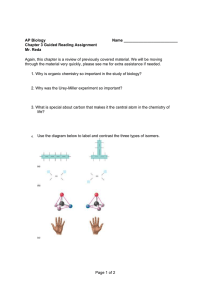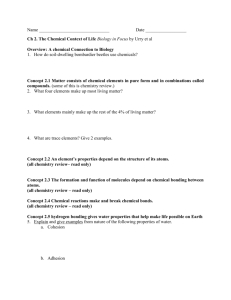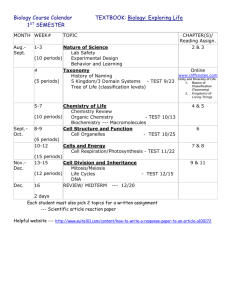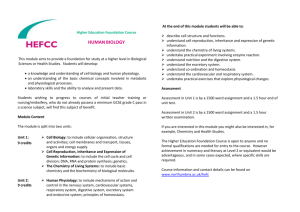High School Science
advertisement
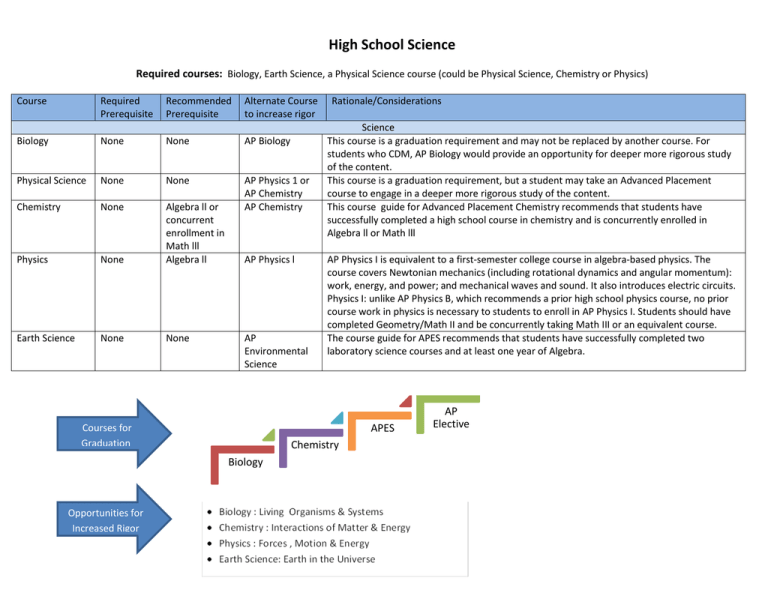
High School Science Required courses: Biology, Earth Science, a Physical Science course (could be Physical Science, Chemistry or Physics) Course Required Prerequisite Recommended Prerequisite Alternate Course to increase rigor Biology None None AP Biology Physical Science None None Chemistry None Physics None Algebra ll or concurrent enrollment in Math lll Algebra ll AP Physics 1 or AP Chemistry AP Chemistry Earth Science None None AP Physics l AP Environmental Science Science This course is a graduation requirement and may not be replaced by another course. For students who CDM, AP Biology would provide an opportunity for deeper more rigorous study of the content. This course is a graduation requirement, but a student may take an Advanced Placement course to engage in a deeper more rigorous study of the content. This course guide for Advanced Placement Chemistry recommends that students have successfully completed a high school course in chemistry and is concurrently enrolled in Algebra ll or Math lll AP Physics I is equivalent to a first-semester college course in algebra-based physics. The course covers Newtonian mechanics (including rotational dynamics and angular momentum): work, energy, and power; and mechanical waves and sound. It also introduces electric circuits. Physics I: unlike AP Physics B, which recommends a prior high school physics course, no prior course work in physics is necessary to students to enroll in AP Physics I. Students should have completed Geometry/Math II and be concurrently taking Math III or an equivalent course. The course guide for APES recommends that students have successfully completed two laboratory science courses and at least one year of Algebra. APES Courses for Graduation Chemistry Biology Opportunities for Increased Rigor Rationale/Considerations AP Elective Sequence for Rigor Courses for Rigor Earth Science : Earth in the Universe Physics : Forces , Motion & Energy Chemistry: Interactions of Matter & Energy Biology: Living Organisms AP Biology Recommended Prerequisite Biology , Chemistry Biology , Honors Description of Content Students study the basic principles and concepts covered in an introductory “General Biology” college-level course. Topics include the structure and function of cells and organisms, the organization, requirements and development of living systems, and heredity and evolution. Students are provided in-depth laboratory experiences. It is expected that students enrolled in this course will take the College Board Advanced Placement Test. Content and principles for biology are taught but in greater depth and magnitude. Students do extensive research, independent study, and laboratory investigations. This course is designed for students who have shown superior achievement and high interest in previous science courses. The final exam is the North Carolina Biology End-of-Course Test. Anatomy & Physiology , Honors Biology , Chemistry AP Chemistry Chemistry Chemistry , Honors Algebra ll , or Math lll Chemistry The concepts and principles of chemistry are presented in greater depth and at a more rapid pace than in Academic Chemistry. Students perform extensive research, independent study, and laboratory work. Theoretical and mathematical relationships in chemistry ar e studied. Geometry/Math ll , Math lll AP Physics I is equivalent to a first-semester college course in algebra-based physics. The course covers Newtonian mechanics (including rotational dynamics and angular momentum): work, energy, and power; and mechanical waves and sound. It also introduces electric circuits. Organic Chemistry AP Physics l This course is designed for the student with a strong background and interest in biology. A detailed study of the human body, including gross structure of the body and physiology, provides the framework of the course. Students are provided more extensive laboratory experiences and independent research than students enrolled in Anatomy and Physiology. Students study the basic principles and concepts covered in an introductory “General Chemistry” college-level course. Topics include chemical composition, stoichiometry, atomic structure, bonding, molecular structure, chemical reactions, states of matter, and solutions. It is expected that students enrolled in this course will take the College Board Advanced Placement Test. Organic Chemistry provides greater in-depth analysis of some topics presented in chemistry such as atomic structure and bonding. In addition, it affords the opportunity for the study of topics not covered in chemistry such as biochemistry and electrochemistry. Physics I: unlike AP Physics B, which recommends a prior high school physics course, no prior course work in physics is necessary to students to enroll in AP Physics I. Students should have completed Geometry/Math II and be concurrently taking Math III or an equivalent course. Although the Physics I course includes basic use of trigonometric functions, this understanding can be gained either in the concurrent math course or in the AP Physics I course itself. AP Physics ll AP Physics l AP Physics II is equivalent to a second-semester college course in algebra-based physics. The course covers fluid mechanics; thermodynamics; electricity and magnetism; optics; and atomic and nuclear physics. Physics II: Students should have had AP Physics I or a comparable introductory course in physics. Students should have taken or be concurrently taking precalculus or an equivalent course. AP Physics C : Mechanics Advanced Math , Chemistry , Physics This course should provide instruction in each of the following six content areas: kinematics; Newton’s law of motion; work, energy and power; systems of particles and linear momentum; circular motion and rotation; and oscillation and gravitation. AP Physics C :Electricity & Magnetism Advanced Math , Chemistry , Physics This course should provide instruction in each of the following five content areas: electrostatics; conductors, capacitors and dielectrics; electric circuits; magnet fields; and electromagnetism. AP Environmental Science Two high school lab course Earth Science , Honors The AP Environmental Science course is designed to be the equivalent of an introductory college course in environmental science. The goal of the AP Environmental Science course is to provide students with the scientific principles, concepts, and methodologies required to understand the interrelationships of the natural world, to identify and analyze environmental problems both natural and human-made, to evaluate risks associated with these problems, and to examine alternative solutions for resolving and/or preventing them. It is expected that students enrolled in this course will take the College Board Advanced Placement Test. This course focuses on inquiry into the functions of the earth's systems. Emphasis is placed on matter, energy, coastal dynamics, environmental awareness, materials availability, and the cycles that circulate energy and material thorough the earth systems. Laboratory work is a major component of the course.
